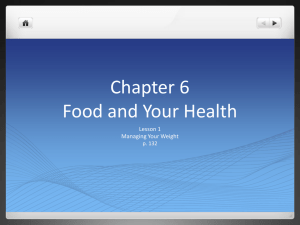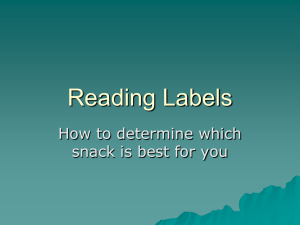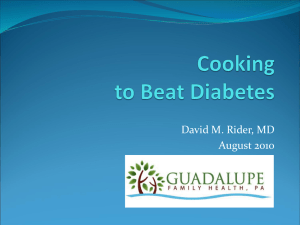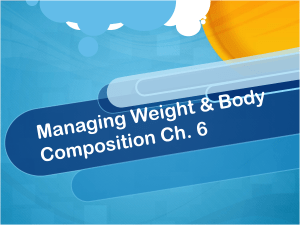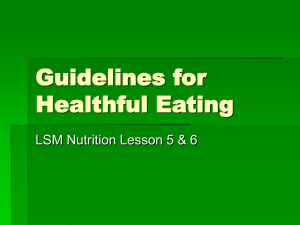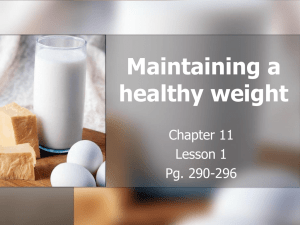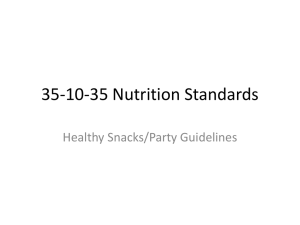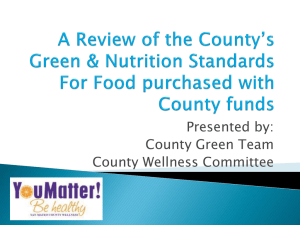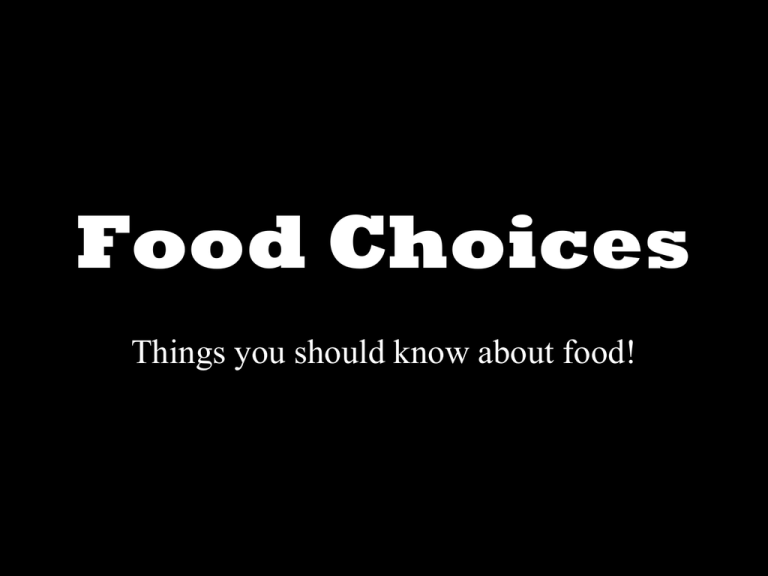
Food Choices
Things you should know about food!
We are built to love the taste of
sugar, fat and salt.
• These things were hard to find as recently as
a couple hundred years ago
– Sugar – Quick, easy to digest energy
– Fat – High calorie (need to eat less to get the
energy you need)
– Salt – Regulates body fluids, hard to find except
in sea water (where plants/animals don’t grow)
• Now that they are easy to find, we haven’t
lost our taste for them and eat them in excess
Eating sugar releases dopamine
(feel good) in the brain.
• You really do feel good when you eat sweets
– Ice cream after you’ve been dumped
You usually eat more when you
are eating out than at home.
• Restaurants have larger portions
– We feel like we need to finish our plates
• You don’t know what you are eating, so you
are more likely to eat something you
normally wouldn’t
– Usually restaurants add salt, fat and sugar
because it’s soooooo tasty!
Big portions when eating out…
Claim Jumper
Classic Cheeseburger
Total Calories
1450
Saturated Fat (g)
29
Cholesterol (mg)
184
Sodium (mg)
2488
Total Carbs (g)
66
Fiber (g)
4
Protein (g)
60
Chicken Quesadilla
Total Calories
Saturated Fat (g)
Cholesterol (mg)
Sodium (mg)
Total Carbs (g)
Fiber (g)
Protein (g)
Max Calories: 1800 to 2000
Max Sodium: 2400mg
1677
42
292
2458
127
16
92
Big portions when eating out…
Claim Jumper
Chicken Caesar Salad
Total Calories
1322
Saturated Fat (g)
23
Cholesterol (mg)
190
Sodium (mg)
2292
Total Carbs (g)
55
Fiber (g)
5
Protein (g)
77
Organic Spinach Salad
Total Calories
1075
Saturated Fat (g)
18
Cholesterol (mg)
49
Sodium (mg)
1257
Total Carbs (g)
77
Fiber (g)
6
Protein (g)
28
Max Calories: 1800 to 2000
Max Sodium: 2400mg
“Energy” drinks don’t give you
energy.
• Energy comes from calories…
“Energy” drinks don’t give you
energy.
• “Energy” drinks don’t have calories, they
have stimulants
– Red Bull has 115 calories
– Monster has 100 calories
• They make your heart beat faster
– This increases blood flow (more oxygen)
– Alters your brain chemistry
• Usually naturally regulates its oxygen supply, but
stimulants in the diet prompt the brain to stop
“Energy” drinks don’t give you
energy.
• “Energy” drinks don’t have calories, they
have stimulants
– Red Bull has 115 calories
– Monster has 100 calories
• They make your heart beat faster
– This increases blood flow and makes you feel
more awake because your brain is getting more
oxygen… for a while.
Sugar is not healthy energy.
• Simple sugars are enter the blood stream
quickly
• Pancreas releases hormones to stabilize
blood sugar
• Eating sugar frequently may overwork the
pancreas
• Leads to diabetes
Brown sugar is NOT healthier
than white sugar.
• Brown sugar = White sugar + molasses
Long ago, some sugar was brown because it was less processed… it is still
possible to find this “raw” sugar in some stores.
1 teaspoon
17.47 calories
4.46 g sugar
1 teaspoon
16.25 calories
4.19 g sugar
Corn Syrup is the most common
sweetener used.
• Soda, Candy, Cookies/Cakes, Crackers…
1 teaspoon
62.26 calories
4.19 g sugar
1 teaspoon
16.25 calories
4.19 g sugar
High Fructose Corn Syrup
• Processed corn sugar (almost entirely grown
using GMOs and pesticides)
• Cheap to produce
– Most common sweetener in products
– Adults who drink one soda or more per day are
27 % more likely to be overweight
• Evidence body processes it differently than
sugar (more likely to store it)
Super Fun
Exciting
Video Time
http://www.youtube.com/watch?v=F10EyGwd57M
Has Vitamins ≠ Healthy
• Almost all foods a little bit of vitamins
– In some foods the amount is tiny
• Depends of the ratio of calories to vitamins
– High calorie, low vitamin (WORST!)
– Low calorie, high vitamin (BEST!)
Skipping meals is BAD for
your body!
• Starving your body for part of the day will
encourage it to store when you finally eat
• Eat frequently but…
– Eat smaller meals
– Eat fewer calories than you burn
If you’re very hungry, you feel better
as soon as food enters your stomach.
• Hypothalamus triggers hunger & thirst
responses
• Release of stored sugar from liver
– Perhaps because your body knows the store of
sugar will be replenished
Slow down to tell how full you are
and if you need to keep eating.
• Hypothalamus triggers hunger & thirst
responses
• Food takes a while move from the stomach
to small intestines where it is absorbed
• They say it takes about 20 minutes for your
stomach to signal whether or not it’s full
• Eating quickly may give your body more
calories than it needed! Slow down!
Just because it has fruit doesn’t
mean that it’s healthy.
• Many fruit products have sugar added!
• Many “fruit” products have coloring added
(to give the impression they have more fruit)
• Some fruits do not have very many vitamins
Sugar-free is not necessarily better!
• Regular Coke – 240 calories and 0 vitamins
• Diet Coke – 0 calories and 0 vitamins
Sugar-free is not necessarily better!
• Does not change diet habits!
• Controversy over health risks of sugar
substitutes:
– saccharin, aspartame, sucralose, neotame,
acesulfame potassium, and stevia
– Some testing demonstrates increase risk of
cancer and other disease in lab animals
Super Fun
Exciting
Video Time
http://www.youtube.com/watch?v=E_ewjop5Ias
Sugar Alcohol: http://www.ynhh.org/online/nutrition/advisor/sugar_alcohol.html
Foods high in saturated fat and
cholesterol can lead to blocked
arteries and heart disease
• HDL Cholesterol and fat build plaques which
block blood flow
• Heart attacks (and strokes) can result
Not all fats are the same:
• Saturated fat = hydrogen attached to every carbon
in the chain
• Trans fat = technically “unsaturated,” however,
doesn’t have the health benefits of unsaturated
• Mono unsaturated fat = one spot where hydrogen
is not attached
• Poly unsaturated fat = multiple spots where
hydrogen is not attached
Elaidic acid is the
principal trans unsaturated fatty
acid often found in partially
hydrogenated vegetable oils
Oleic acid is
a cis unsaturated fatty
acid that comprises
55–80% of olive oil.
Stearic acid is a saturated fatty acid
found in animal fats and is the intended
product in full hydrogenation. Stearic
acid is neither cis nor transbecause it
has no double bonds
Fat-free is not always better!
• Does not change diet habits!
• Controversy over health risks of fat
substitutes:
– “Anal leakage” as a potential side-effect
– Decrease in the absorption of vitamins
Foods can affect your moods!
• Sugar – temporary spike in dopamine
• Tryptophan – anti-depressant properties
(slow the break down of serotonin)
– Turkey, chicken, chocolate, peanuts, pumpkin
seeds, milk products
– Also makes people drowsy
• Protein – increases alertness (amino acid
used in neural transmitters
Calories are necessary!
• Calories are needed for energy
• If you do not get enough calories your body
will starve
• During starvation the body breaks apart its
muscles and organs to get the energy it
needs
You lose weight when you eat
fewer calories than you use.
• Eating fewer calories and/or exercise
• Exercise releases feel-good chemicals into
your blood and increases well-being
• Exercise builds muscle and increases bone
density
– Bone density can only increase through the
early 20s, after that it decreases!
Eat when you’re hungry.
• We naturally regulate our calorie intake
– Evidence that processed foods decrease our
ability to do this
– High fructose corn syrup, soft drinks, salty
snack foods
• Don’t eat if you’re not hungry.
– Snacking out of habit or boredom
Ways to improve your diet:
1. Vary your foods!
2. Decrease the amount of processed or prepackaged food (including fast food).
3. SLOW DOWN when eating.
4. Decrease your portion size, especially
when eating out – it’s okay to leave some
on your plate.
Things to do to stay healthy!
• Anything that touches Eyes, Nose, Mouth,
or Genitals should be clean and disease-free
– Wash your hands!
• Take care of yourself
–
–
–
–
–
Healthy food
Exercise
Sleep
Happiness
Avoid Toxins (alcohol, harsh chemicals, etc.)

